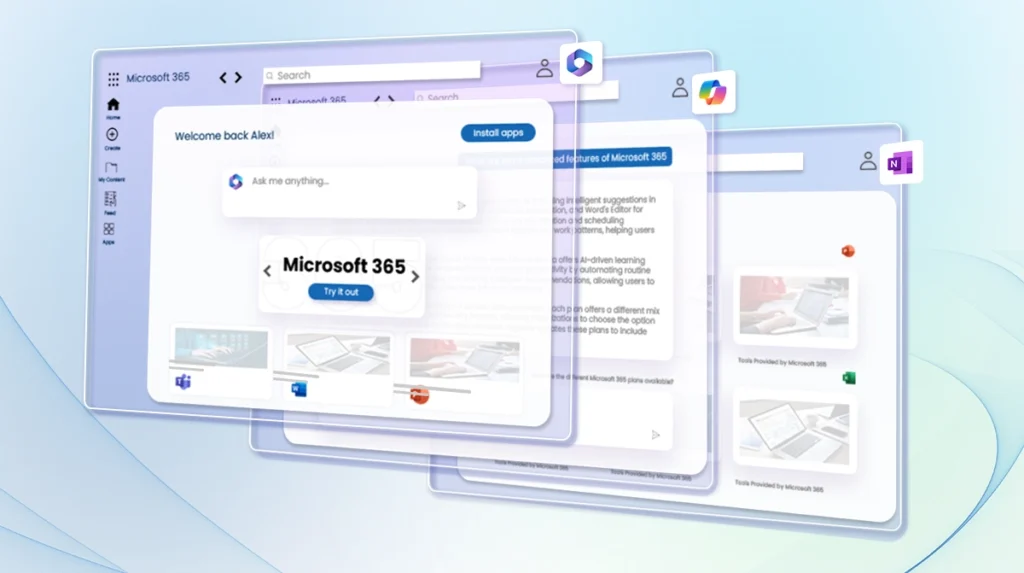Introduction
In today’s digital world, businesses and individuals alike are constantly seeking ways to enhance their productivity and streamline their workflows. Enter Microsoft 365, a comprehensive suite of cloud-based productivity tools designed to empower users to achieve more. This powerful platform combines familiar Office applications like Word, Excel, and PowerPoint with robust cloud services such as OneDrive, Teams, and Outlook.
It’s not just about having access to the latest versions of the Microsoft Office Suite; it’s about embracing a whole new paradigm of collaboration, communication, and creativity.
With Microsoft 365, users can collaborate in real time, access files from anywhere, and leverage advanced features like AI-driven insights and robust security measures. It’s the ultimate solution for modern work, enabling seamless integration of various aspects of business operations.
Let’s explore what makes Microsoft 365 the preferred choice for businesses looking to boost their productivity and stay competitive in the digital age.
Tools Provided by Microsoft 365
Microsoft 365 offers a comprehensive set of tools that cater to various business needs. Here’s an overview of the critical components:
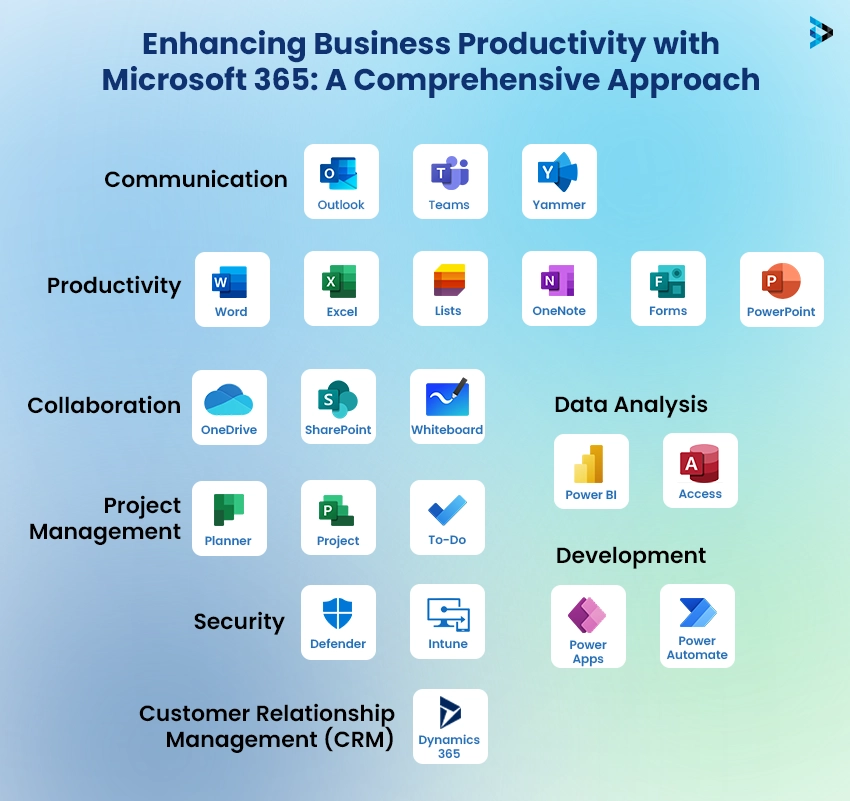
- Access to Microsoft Office Applications: The heart of Microsoft 365 is the suite of familiar Office applications, including Word, Excel, PowerPoint, Outlook, OneNote, Publisher, and Access. These tools have been the backbone of business productivity for decades, and their cloud-enabled versions offer even more functionality.
- Cloud Storage with OneDrive: OneDrive provides secure cloud storage, allowing users to access their files from any device, anywhere. This feature is crucial for businesses embracing remote work and needing flexible access to their data.
- Collaboration Tools: Microsoft Teams and SharePoint are powerful platforms for team collaboration. Teams serves as a hub for communication, integrating chat, video meetings, and file sharing. SharePoint enables the creation of intranet sites for document management and internal communications.
- Security Features: Microsoft 365 includes robust security measures such as data encryption and malware protection. These features are essential for businesses handling sensitive information and looking to protect their digital assets.
- Technical Support: As a Microsoft Partner, we can attest to the value of having direct access to Microsoft’s technical support. This ensures that any issues are resolved quickly, minimizing downtime and maintaining productivity.

Microsoft 365: A Multifaceted Approach to Boosting Business Productivity
Collaboration Gets a Turbo Boost
Unified Hub for Communication
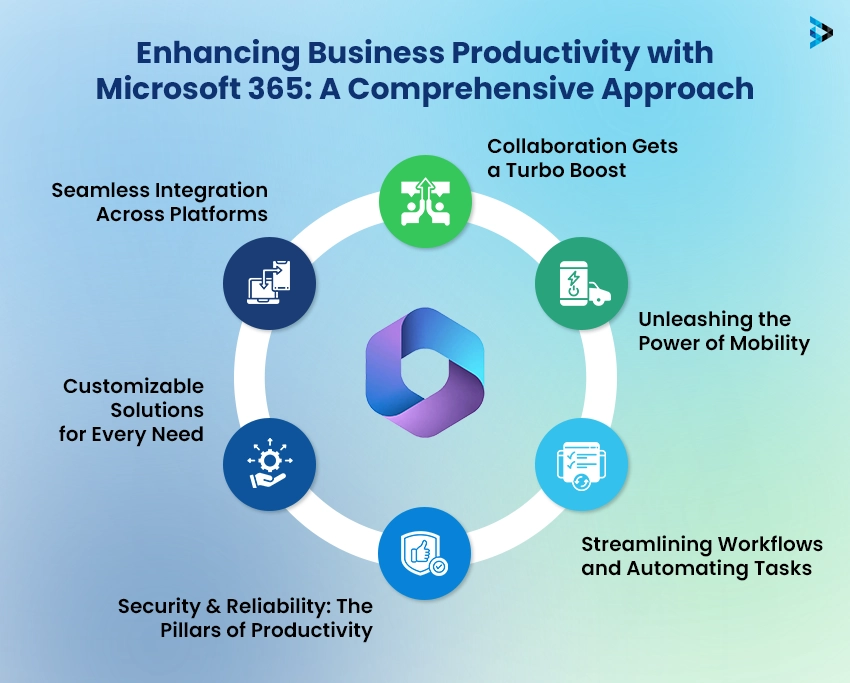
Microsoft Teams stands out as a game-changer in the realm of business communication. As part of the Microsoft 365 ecosystem, Teams integrates seamlessly with other Office applications, creating a unified hub for all forms of collaboration. Whether it’s instant messaging, video conferencing, or document sharing, Teams brings everything together in one place.
For businesses leveraging Microsoft Enterprise Development, Teams can be customized and extended to fit specific organizational needs. With the support of AEM consultancy services, businesses can further enhance their Teams integration for a seamless digital experience. This level of integration and customization makes Teams an invaluable tool for fostering a collaborative culture, regardless of team members’ physical locations.
Farewell to Version Control Chaos
One of the most significant advantages of using Microsoft 365 is the end of version control nightmares. With real-time co-authoring in applications like Word, Excel, and PowerPoint, multiple team members can work on the same document simultaneously. Changes are synced in real-time, eliminating the need for back-and-forth emailing of document versions.
This feature is particularly beneficial for businesses engaged in complex projects or those with distributed teams. It ensures that everyone is always working on the most up-to-date version of a document, reducing confusion and increasing efficiency.
Knowledge Silos Crumble
SharePoint, another key component of Microsoft 365, plays a crucial role in breaking down knowledge silos within organizations. By providing a centralized platform for document storage, sharing, and collaboration, SharePoint ensures that information is accessible to those who need it, when they need it.
For businesses partnering with a Microsoft Gold Partner, SharePoint’s advantages can be further amplified. Gold Partners have the expertise to tailor SharePoint to specific business needs, creating custom solutions that enhance information flow and collaboration across the organization.
Unleashing the Power of Mobility
Location Independence
In an era where remote work has become the norm for many, the ability to work from anywhere is no longer a luxury—it’s a necessity. Microsoft 365’s cloud-based approach ensures that users have access to their files and applications regardless of their location. This flexibility is crucial for businesses aiming to maintain productivity in a mobile workforce.
The Microsoft Office 365 Services extend beyond just providing access to documents. With features like Outlook’s web access and mobile apps for all major Office applications, employees can stay productive even when they’re on the go. This mobility is a key factor in enabling businesses to adapt to changing work environments and maintain continuity in various scenarios.
Offline Doesn’t Mean Out of Action
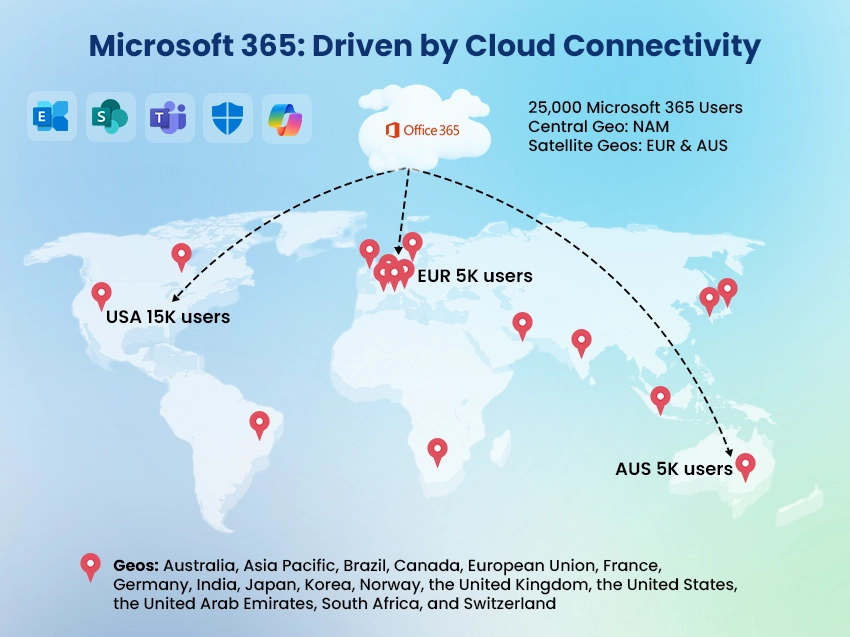
Source: https://learn.microsoft.com/en-us/microsoft-365/enterprise/microsoft-365-multi-geo?view=o365-worldwideWhile cloud connectivity is at the heart of Microsoft 365, the suite doesn’t leave users stranded when they’re offline. Many applications within the suite offer offline functionality, allowing users to continue working even without an internet connection. Once reconnected, changes are automatically synced to the cloud, ensuring seamless continuity of work.
This feature is particularly valuable for businesses with employees who frequently travel or work in areas with unreliable internet connections. It ensures that productivity doesn’t grind to a halt due to connectivity issues.
Streamlining Workflows and Automating Tasks
Repetitive Tasks? Automate Them!
One of the most powerful aspects of Microsoft 365 is its ability to automate repetitive tasks, freeing up valuable time for more strategic work. The Microsoft Power Platform, which includes Power Automate (formerly Flow), allows users to create automated workflows across multiple applications.
For instance, a business could automate the process of sending follow-up emails after client meetings, or create a workflow that automatically routes documents for approval. These automations can significantly reduce manual work, minimize errors, and speed up processes.
Visualize Your Way to Success
Data visualization is a critical component of modern business decision-making. Microsoft PowerBI, an effective business intelligence tool, integrates seamlessly with other Microsoft 365 applications. It allows users to create interactive dashboards and reports, turning raw data into actionable insights.
For businesses looking to leverage the full potential of their data, the Power BI Support Channel provided by Microsoft partners can be invaluable. These experts can help set up complex data models, create custom visualizations, and ensure that businesses are making the most of their data assets.
Tame the Email Beast
Email management is a significant productivity challenge for many businesses. Outlook, as part of Microsoft 365, offers advanced features to help users regain control of their inboxes. From AI-powered email sorting to focused inboxes that prioritize important messages, Outlook provides tools to manage email more efficiently.
Moreover, Outlook’s integration with other Microsoft 365 applications allows for seamless transitions between email and other tasks. For example, an email attachment can be quickly saved to OneDrive or SharePoint, or a Teams meeting can be scheduled directly from an email conversation.
Security & Reliability: The Pillars of Productivity
Fort Knox for Your Data
Security is paramount in an age of increasingly common data breaches. Microsoft 365 incorporates robust security features to protect business data, including advanced threat protection, data loss prevention, and multi-factor authentication.
The security benefits are even more pronounced for businesses using Microsoft Azure Cloud Services in conjunction with Microsoft 365. Azure provides additional layers of security and compliance features, making it an ideal choice for companies handling sensitive data.
Always Up-to-Date
One of the significant advantages of being a Microsoft Partner is the assurance that your business always has access to the latest features and security updates. Microsoft 365 applications are automatically updated, ensuring that users always have the most current versions without the need for manual updates or installations.
This automatic update feature not only provides access to the latest productivity enhancements but also ensures that security patches are promptly applied, reducing vulnerability to cyber threats.
Cloud Backup = Peace of Mind
Data loss can be catastrophic for businesses. With Microsoft 365’s cloud-based approach, data is continuously backed up in the cloud. This means that even in the event of hardware failure or other disasters, business data remains safe and accessible.
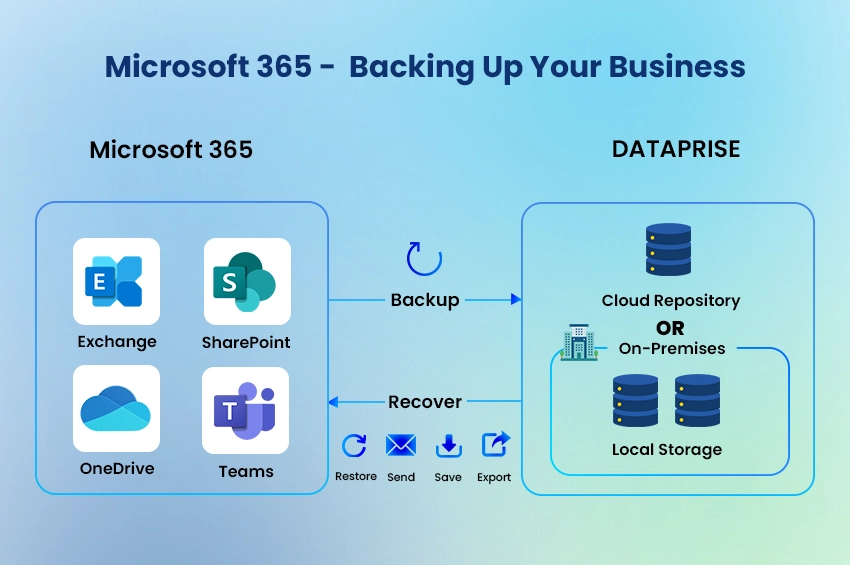
For businesses that require additional backup and recovery options, Microsoft Azure Cloud is the best choice. It offers robust backup and disaster recovery solutions that can be tailored to specific business needs, ensuring business continuity in any scenario.
Final Thoughts
Microsoft 365 stands as a testament to the power of integrated, cloud-based productivity tools. From enhancing collaboration and enabling mobility to streamlining workflows and ensuring security, it offers a comprehensive solution for modern businesses.
The advantages of being a Microsoft Gold Partner are that it allows us to provide expert guidance in implementing and optimizing Microsoft 365 for specific business needs.
Whether it’s leveraging the Microsoft Power Platform for custom solutions, harnessing the power of Microsoft PowerBI for data-driven decision-making, or utilizing Microsoft Azure Cloud Services for enhanced security and scalability, Microsoft 365 offers a versatile toolset for businesses of all sizes.
In today’s digital landscape, where agility and efficiency are key to success, Microsoft 365 emerges as more than just a suite of applications—it’s a complete ecosystem designed to drive business productivity to new heights. By embracing this all-in-one productivity suite, businesses can position themselves at the forefront of innovation, ready to tackle the challenges of the modern workplace.
Read more: Microsoft Edge: Boosting Productive Web Browsing Experience.
FAQs
Microsoft 365 offers several advanced features powered by AI, including intelligent suggestions in PowerPoint Design Ideas, Excel’s Smart Lookup for contextual information, and Word’s Editor for advanced writing assistance. Outlook leverages AI for email prioritization and scheduling assistance. Microsoft MyAnalytics provides personalized insights into work patterns, helping users optimize their time and focus.
Power BI uses AI to uncover hidden trends in data, while Microsoft Viva offers AI-driven learning and knowledge discovery. These AI-driven features enhance productivity by automating routine tasks, providing data-driven insights, and offering intelligent recommendations, allowing users to focus on high-value activities and make more informed decisions.
Microsoft 365 offers a range of plans tailored to different user needs. For individuals and families, there’s Microsoft 365 Personal and Family. Business plans include Basic, Standard, and Premium, catering to small and medium-sized organizations with varying levels of features and support. For larger enterprises, Microsoft 365 E3 and E5 plans provide comprehensive solutions with advanced security and compliance features.
Education-specific plans are available for schools and universities. Each plan offers a different mix of applications, cloud services, and security features, allowing organizations to choose the option that best fits their requirements and budget. Microsoft regularly updates these plans to include new features and services.
Microsoft 365 employs a multi-layered approach to ensure data security. At the infrastructure level, data centers are physically secured and monitored 24/7. Data in transit and at rest is encrypted using industry-standard protocols. Multi-factor authentication and conditional access policies help prevent unauthorized access. Advanced Threat Protection safeguards against malware and phishing attempts.
Data Loss Prevention policies prevent sensitive information from leaving the organization. Compliance features help meet various regulatory requirements. Regular security updates are automatically applied to all applications. Microsoft also provides detailed security and compliance documentation, empowering administrators to configure security settings according to their organization’s needs. Additionally, Microsoft’s transparent approach to privacy ensures that customer data is not used for advertising or other commercial purposes.
Microsoft offers extensive training resources for Microsoft 365 users. The official Microsoft Learn platform provides free, self-paced online courses covering various aspects of Microsoft 365, from basic usage to advanced administration. Microsoft 365 Training Center offers role-based learning paths for end-users, IT professionals, and developers. For hands-on practice, Microsoft provides interactive guides and lab simulations.
The Microsoft 365 YouTube channel features tutorial videos and product updates. Microsoft also offers certification programs for IT professionals looking to validate their skills. For organizations, Microsoft 365 Learning Pathways is a customizable training solution that can be deployed within SharePoint. Additionally, Microsoft’s network of partners provides specialized training and workshops tailored to specific industry needs.
Related Articles
-
Implement The Most Favored Automated Ticketing System
There are several technologically-advanced solutions to improve functionality of your business. Your business gravitates around your customers and employees, so it is imperative to implement a system that allows you
-
Advantage of being a Microsoft Gold Partner
While many people worry about the downsides of being a Microsoft gold partner, the fact is that there are plenty of advantages to being a Microsoft Gold Partner. A Microsoft
-
The Microsoft Power Platform – Empowering Millions of People to Achieve more
By 2023, 500 million apps will be developed to drive organizational transformation and productivity. Microsoft is at the forefront of this digital transformation, aiming to assist businesses to reimagine how

